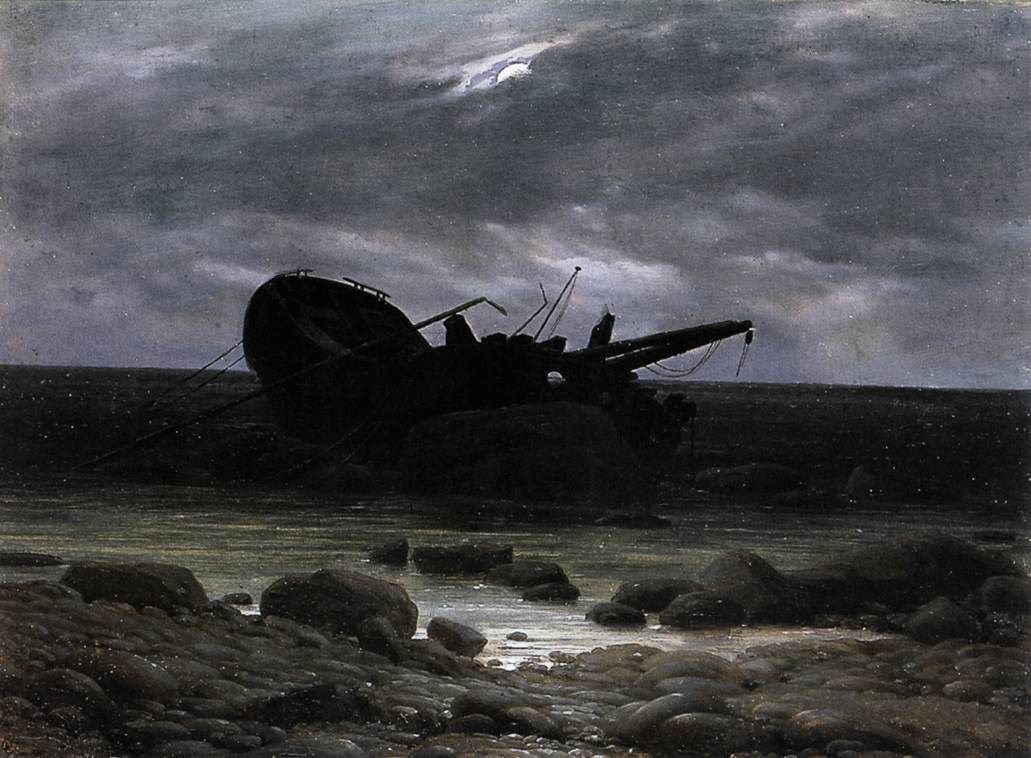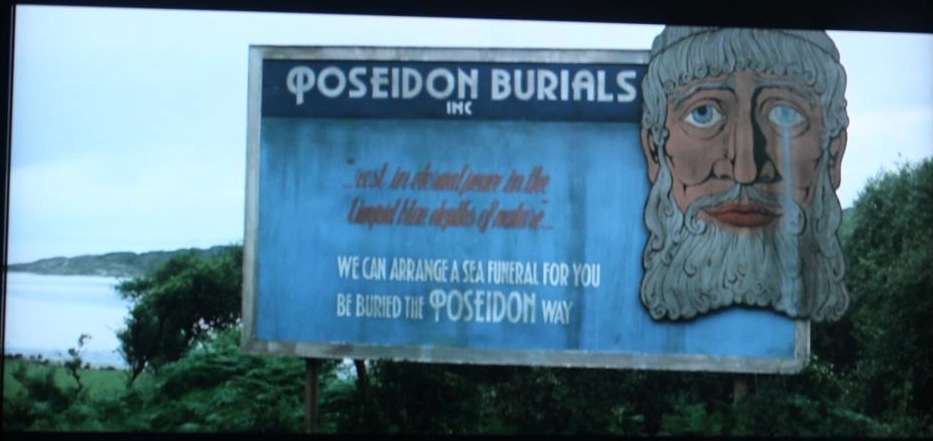

Caspar David Friedrich, "Wreck in the Moonlight"
Course Description: "We were like men walled up in a roomy grave," Joseph Conrad, Lord Jim (Oxford World Classics), p. 88.
This is a course about reading at sea, reading from the surface, in the wake of disaster. We will sink and swim as we engage a number of themes that recur in stories about shipwrecks, themes such as hospitality to strangers, friends (and enemies); revenge; sacrificial violence; survivors; and ghosts / phantasms; home; homelessness; loss; wandering; destiny; chance; fate; slaves; self-defense; piracy; savages; cannibalism; animals; solitude; recognition scenes; returning home and crossing the point of no return; the return of the dead. We will touch on these themes as they bear on a central hypothesis we will test out: Shipwreck narratives and abandon ship narratives are surprisingly about burial, not of the dead, but of the living; that is, the survivors of shipwrecks fear being buried alive, possibly cremated, possibly eaten, but do not fear burial at sea (marination?); these narratives, moreover, evince a correlary concern with the eco-specific destruction of writing instruments and storage media--books, journals, pens, ink, posts, captains' logs, and so on). This fear of premature burial (and a correlary anxiety about not protecting and not honoring the dead--no funerals, corpses being mutilated, left unburied, eaten, and otherwise indisposed) plays out in encrypted narratives as well, narratives-within-narratives, repeated narratives, that are often highly resistant to reading; sometimes, one does know whether to read by fathoming the depths or trusting the surface. Writing, weaving ,marking; footprints; journals, writing materials, lost manuscripts, coffins, tombs, urns, burial mounds, and various kinds of crypts, are at the center of a disaster genre in which fear of drowning almost never plays a part. We will read more or less chronologically--stories in different genres--epic, romance, spiritual autobiography, novel--and in different media--song (and its transcription), theater, print, and film-- that I have culled but not necessarily rescued from a variety of literary historical periods. We will also read--These texts are Homer, The Odyssey; Daniel Defoe, Robinson Crusoe; Edgar Allen Poe, "A Premature Burial"; Jacques Derrida, Beast and the Sovereign Vol. 2; Jacques Derrida, Hospitality; William Shakespeare, The Tempest; Edgar Allen Poe, The Narrative of Arthur Gordon Pym of Nantucket; Herman Melville, Moby Dick; and Joseph Conrad, Lord Jim. We will also see these films: Alfred Hitchcock, Lifeboat (1944); Julie Taymor,The Tempest (2010); Peter Greenaway,The Tempest (1991); A Night to Remember (dir. Roy Ward Baker, 1958); and LIVING SKELETON (1968, Japan, originally titled Kyuketsu Dokuro Sen). Three papers, 1k each; short writing assignments and quizzes for each class; co-lead class discussion once on a Tuesday.
But, just as, after mighty shipwrecks piled,
The mighty main is wont to scatter wide
The rowers' banks, the ribs, the yards, the prow,
The masts and swimming oars, so that afar
Along all shores of lands are seen afloat
The carven fragments of the rended poop,
Giving a lesson to mortality
To shun the ambush of the faithless main,
The violence and the guile, and trust it not
At any hour, however much may smile
The crafty enticements of the placid deep:
Exactly thus, if once thou holdest true
That certain seeds are finite in their tale,
The various tides of matter, then, must needs
Scatter them flung throughout the ages all,
So that not ever can they join, as driven
Together into union, nor remain
In union, nor with increment can grow-
But facts in proof are manifest for each:
Things can be both begotten and increase.
'Tis therefore manifest that primal germs,
Are infinite in any class thou wilt-
From whence is furnished matter for all things.
Lucretius, On the Nature of Things

Recommended Readings:
Hans Blumenberg, Shipwreck with Spectator: Paradigm of a Metaphor for Existence;
Stéphane Mallarmé, "Un coup de dés jamais n’abolira le hasard" ;
Primo Levi's narration of the shipwreck of Ulysses in Survival in Auschwitz.
Garcia Marquez, Story of a Shipwrecked Sailor
Jack London, The Sea Wolf
Mat Johnson, Pym; Jorge Luis Borges, "Book of Imaginary Beings"
Franz Kafka, "The Hunter Gracchus"
Richard Wagner, The Flying Dutchman